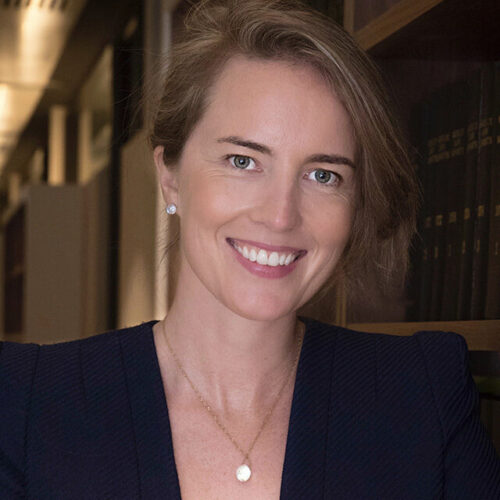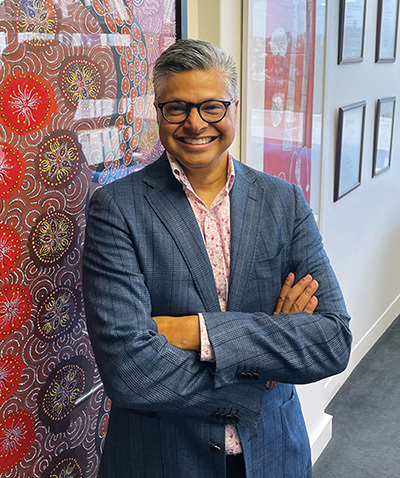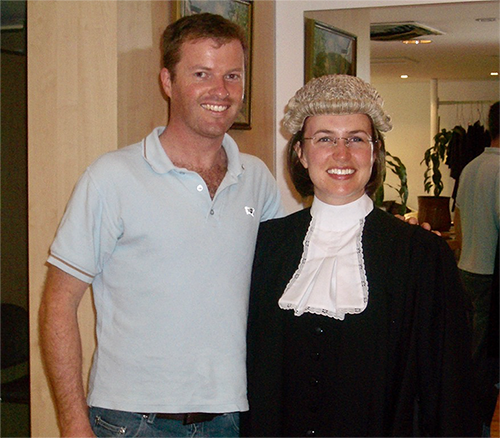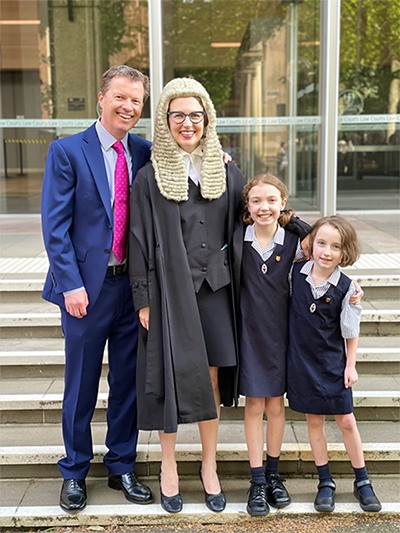
Talitha Fishburn wanted to discover what two experienced barristers, Lester Fernandez and Cynthia Cochrane SC thought about the decisions they had made in their careers. She discovered some salient lessons for aspiring and newer barristers
Professional background
Lester Fernandez was admitted as a solicitor in 1993. He was admitted as a barrister in 2007. He specialises in criminal law at both trial and appellate levels along with coronial inquests and professional disciplinary matters.
Cynthia Cochrane SC started work as a junior solicitor in 2001 and was admitted in 2002. She was admitted as a barrister in 2005. She took silk in 2021. She specialises in patent cases and commercial cases including competition law.
The Call
Lester’s decision to come to the Bar was motivated by a strong passion for advocacy. As a solicitor, he had undertaken considerable advocacy experience, especially working at Legal Aid NSW, but he wanted that skill to be his speciality.
Cynthia’s call to the Bar was prompted by a desire to be ‘at the pointy end’ of litigation; the courtroom. Although she enjoyed being a solicitor, she wanted to carry matters through to hearing rather than ‘hand it over once things got interesting’. The turning point for Cynthia came when a partner she was working with asked her to stay back in the office on another matter rather than attend the hearing in her original matter.

The Journey
Lester came to the Bar at the relatively late age of 37. He had been a solicitor for 13.5 years. He came to the Bar with ‘very little understanding of what it would be like’. His aim was to ‘run District Court trials’. He feels fortunate to have achieved that goal and gone on to experience other areas of law and work, including criminal appellate work and inquests and professional disciplinary work, which were not necessarily in his field of vision as a new barrister.
Cynthia came to the Bar in her late 20s. This was relatively young given the average age in her Bar Course was about 35 years. She had been a solicitor for four years. The first two years were in Melbourne, her hometown, then in Sydney through a law firm merger. She arrived in Sydney with her then boyfriend, now husband. They soon grew to love living in Sydney. Prior to then, Cynthia had worked as an investment banker and had lectured in economics and finance at Melbourne University. Despite being relatively young and not knowing what life at the Bar would entail, Cynthia says ‘if the clock was wound back I would do it all again, even at a young age’.
‘I felt that I had to accept the new brief because I feared that they would go elsewhere and stop briefing m
Reader Appetite
As readers, both Cynthia and Lester closely identified with the word ‘yes’. They recall an almost unyielding propensity to say ‘yes’ to nearly all work coming their way. Reflecting on this now, they made some observations for future readers.
Lester accepted every brief he possibly could when he started at the Bar. The downside to this was that his preparation time was reduced, particularly if he had trials running consecutively. If he had his time again, Lester would take concrete steps to avoid being constantly busy. Nowadays he consciously thinks about his practice and manages his diary carefully. He deliberately diarises preparation time. When he decides whether to accept a trial, he carefully considers what cases will precede it and which cases will follow it. He spaces out intense work periods with periods which are quieter. Lester loves being a barrister. What is most professionally important to him is maintaining a sustainable practice well into the future, and not a practice which poses a burnout risk.
Cynthia received early advice to ‘cut her teeth’ in some lower jurisdictions. This is despite Cynthia already having earned a reputation as a patent/IP lawyer which was her intended area of practise at the Bar. Despite this, she took the advice and said ‘yes’ to work in a variety of jurisdictions unrelated to her preferred practice areas. If Cynthia had a time machine, she would be more deliberate in focussing more on her preferred area of practice and developing her advocacy and her reputation in that area. But having said that, Cynthia acknowledges that she ‘can’t unscramble the egg’ and that ‘experience is what defines you’. Although she would not repeat those times in the unrelated lower jurisdictions if she had a choice, she recognises some valuable lessons from those early experiences. One learning is to ‘rise above the detail’ and tell a story without getting lost in the detail. This expertise in filtering detail in the presentation of a case is something she has transferred to her patent cases where much of the information is complex and technical and benefits from being distilled into a simpler narrative and calling on the detail when required.
Cynthia also recounts a regret of not proceeding with a prepared holiday with her husband to New York City for the New York marathon because she accepted a brief for that same period. The brief was from a good firm from which she already had numerous other briefs. She says, ‘I felt that I had to accept the new brief because I feared that they would go elsewhere and stop briefing me.’ In the end, the case settled and her husband’s New York marathon experience ended up being one of his all-time life highlights, albeit solo. Reflecting on this episode, Cynthia identifies two lessons. First, solicitors know a ‘safe set of hands’. Once they find them, they don’t forget them, even if a barrister is not available every time. Second, there are some personal life experiences that should not be missed. The New York Marathon is one such event!

Junior briefs
Lester received junior briefs with senior counsel from about his fifth year and beyond. They were excellent learning opportunities. If he had his time again, he would try to take junior work from the outset, given the enormous learning benefits they present, even if that means volunteering to do those matters.
Cynthia received junior briefs early in her career. Like Lester, she identifies the learning benefit from working with established senior counsel. She was also fortunate to work with senior counsel who divided the case vertically such that she had active responsibility for certain parts of the hearing, such as cross-examination.
Solicitors know a ‘safe set of hands’. Once they find them, they don’t forget them, even if a barrister is not available every time
Extracurricular initiatives at the Bar
From his second year, Lester joined the Criminal Law Committee. He is now also a member of the Education Committee. He started assisting with the Bar Practice Course from about his fifth year and is now a regular presenter and advocacy instructor. He has also been a mentor with the Bar Association’s Mentoring program. His suggestion to all barristers is to look for ways to contribute to the Bar, and to the community. The focus in the early years though, should be on developing your practice at the Bar.
Cynthia is the chair of the Wellbeing Committee. If she had her time again, she would have joined the Wellbeing Committee earlier! Discovering the Wellbeing Committee has been an extracurricular highlight for Cynthia. She remembers her first encounter with the Wellbeing Committee, discussing some sleep and health related literature with Kevin Connor SC (another member of the Wellbeing Committee). She was intrigued and instantly felt that she had ‘found her people’ who are similarly passionate about health and wellbeing.
Cynthia has also been a member of a Professional Conduct Committee. She encourages junior barristers to apply for a PCC. She says: ‘They occupy a very important function. They also enable you to observe fellow barristers, many of whom are senior counsel with considerable experience, work through complaints and ethical matters arising in practice.’
Chambers and support networks
Lester and Cynthia remain at the same chambers where they both started. Lester is a member at Forbes Chambers. Cynthia is a member of 5 Wentworth Chambers. They share the view that being at a supportive and collaborative set of chambers is very helpful. Lester advocates getting involved in ‘chambers life’. He looks for opportunities to get together as a group, such as dinners and CPDs. He encourages new barristers to ‘look for opportunities to say hello to people in chambers so long as they are not obviously flat out’.
Cynthia also identifies having a reliable support person (whether that is within the profession or not) as well as mentors on and off the floor. If she had her time again, she would also try to foster more active relationships with more of her immediate peers. She recalls that in her first years of practice, she would take the short ferry home with one of her immediate peers who lived nearby. Although the journey was brief, it was a perfect bite-sized amount of time to have a quick chat about the day and segue from ‘work mode’ to ‘home’. In more recent times, Cynthia has an additional network; her ‘Silk Sisters’, the other female barristers with whom she took silk. She is enjoying this new community immensely. The message that she gives to new barristers is to look for support and community at every level.
Tutors
Both Lester and Cynthia consider that they had excellent tutors when they came to the Bar. Both have since gone on to be tutors themselves. Lester encourages his readers to be proactive and ask for advice and assistance. The reader really needs to drive the reader-tutor relationship, he says.
Advocacy / preparation style
Lester had considerable advocacy experience prior to coming to the Bar, but being a barrister is much more challenging, complicated, and enjoyable, he reflects. Lester consciously learns and reflects on how he can improve as an advocate. One article from the Bar Practice Course particularly resonated with Lester: The Art of Cross Examination by JW Smyth QC (an extract of which was published in Bar News in Autumn 1988 pp 9–18). Its thesis was to self-reflect on one’s advocacy performance. After every court appearance, the author consciously reflected on areas to improve his advocacy. From day one, Lester has implemented this advice. After every court matter, no matter how long or short, Lester writes down what he has learnt from that particular appearance and any mistakes he has made or areas for improvement.
Cynthia’s background in the law was Melbourne-based. The legal culture in Melbourne is characterised by high levels of preparation. She carries the same ethos of high preparation into her work at the Sydney Bar. As an advocate, Cynthia aims to ‘play my natural style’. Given that our job is to persuade, she reasons that playing yourself takes far less energy and tends to be the most persuasive persona. BN

Don’t give in to ‘Barrister Paranoia’. The work will not dry up if a brief is not accepted. Look backwards in your diary, not forwards – that shows you will get work and you will be occupied.
TIPS
Lester and Cynthia each suggested helpful tips for new barristers, including:
If you have a difficult legal problem, systematically work through it, layer by layer. Eventually you will unpack the complexity.
•Never be afraid to ask colleagues for help or advice.
•Be pleasant. Be polite. Work as a team. You will be happier and so will your instructors.
•Don’t give into ‘Barrister Paranoia’. The work will not dry up if a brief is not accepted. Look backwards in your diary, not forwards–that shows you will get work and you will be occupied
.•Play your natural game. Don’t pretend to be someone else. The market will work you out
.•Keep an email folder with positive emails you have been sent. Look at it if you need some encouragement on a tough day.
•If you are having a ‘bad day’ ,think of a time when something went really well and know that you can do it again. It is quite logical.
•Know when to switch off your phone. After hours and on weekends are great times to do so.
•Observe healthy living including proper nutrition, sleep and exercise.
•It’s possible to work every moment of the day. Know when it’s time to stop.
•Run home rather than have a glass of wine
